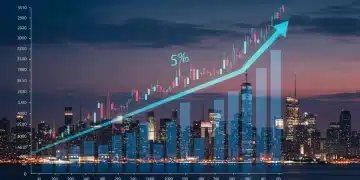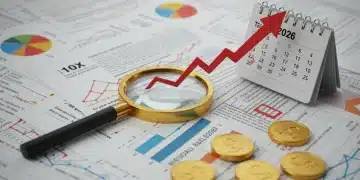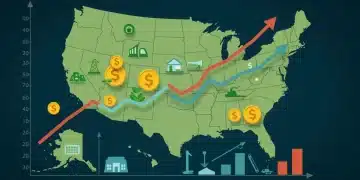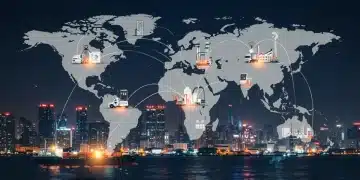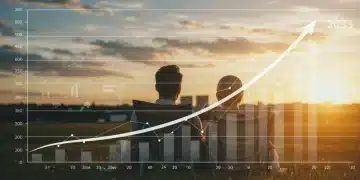Geopolitical risk assessments for investors: what to know

Geopolitical risk assessments for investors involve analyzing global political and economic events to identify potential risks and opportunities that can impact investment decisions.
Geopolitical risk assessments for investors are essential in today’s interconnected world. They help you anticipate challenges and opportunities in your investment landscape. Are you prepared to navigate these complexities?
Understanding geopolitical risks
Understanding geopolitical risks is essential for investors seeking to navigate today’s complex market landscape. These risks arise from political changes, conflicts, and economic instability across the globe. Investors must be aware of how these factors can influence their portfolios, as they can create opportunities as well as challenges.
Types of geopolitical risks
There are various types of geopolitical risks that can affect investments. Knowing the categories helps investors stay informed and prepared.
- Political Risk: This includes changes in government policies or instability that can affect market conditions.
- Economic Risk: Fluctuations in a country’s economic performance due to external factors.
- Social Risk: Factors stemming from social unrest or demographic changes that can impact markets.
- Environmental Risk: Issues related to climate change or natural disasters that may disrupt investments.
By understanding these risks, investors can make informed decisions and adjust their strategies accordingly. For instance, a political risk can lead to sudden regulatory changes, impacting business operations. Investors who anticipate these changes can position themselves better.
Assessing geopolitical risks
To effectively assess geopolitical risks, investors should incorporate several strategies. Monitoring global news and reports is vital. Continuous education on international relations and market dynamics can provide critical insights.
Having a diversified portfolio is another fundamental strategy. This approach helps mitigate risks related to any single market or political event. Furthermore, engaging with experts in geopolitical analysis can enhance understanding and aid in strategic planning.
How global events impact investments

How global events can significantly influence investments is vital for investors to understand. Changes in the world, whether they are political, economic, or social, create ripples that affect financial markets everywhere. By becoming aware of these events, investors can make better decisions and protect their assets.
Political events
Political events are among the foremost factors that can affect investments. A new election, a controversy, or a sudden change in leadership can create uncertainty in the market. Investors must watch these developments closely, as they often lead to immediate financial consequences.
- Regulatory changes: New laws or regulations can alter how companies operate.
- Trade agreements: Changes in trade policies can impact import and export markets.
- Conflict situations: Wars or civil unrest can disrupt markets and supply chains.
Moreover, global relations play a crucial role. For example, when two nations engage in a trade dispute, it may not only affect the involved countries but also ripples through numerous others, impacting stocks and commodities.
Economic events
Economic events, such as crises, recessions, or booms, directly affect investments. A financial crisis in one country can lead to a loss of confidence worldwide. Investors may hesitate to invest, leading to reduced market activity. Understanding the connection between economies is key for assessing potential risks.
For instance, if a country’s economy begins to falter, investors might look to capitalize on opportunities in more stable markets. This shift can create a chain reaction, influencing stock prices and investor sentiment globally.
Strategies for conducting risk assessments
When it comes to conducting risk assessments, having clear strategies is crucial for investors. By using effective methods, you can identify and analyze geopolitical risks that might affect your investments. Let’s explore some key strategies that will enhance your assessment process.
Gathering relevant data
To begin, one must gather relevant data from credible sources. News articles, government reports, and financial analyses provide valuable insights. Make sure to look for information about political stability, economic forecasts, and social trends.
- Use credible news sources: Rely on reputable outlets for the latest updates.
- Monitor international relations: Keep track of diplomatic events that might affect markets.
- Review economic indicators: Focus on growth rates, employment figures, and trade balances.
As you collect this data, it is essential to assess its credibility. Check the author and the organization’s background to ensure the information is accurate and unbiased.
Engage with experts
Another effective strategy is engaging with experts in geopolitical analysis. Analysts can provide a deeper understanding of complex issues and offer tailored insights specific to your investment strategy. Networking through industry events or forums can help you connect with knowledgeable professionals.
These discussions can help clarify uncertainties and offer diverse perspectives that enhance your risk assessment. By collaborating with experts, you not only expand your knowledge but also strengthen your investment decisions.
Tools for effective geopolitical analysis

Utilizing the right tools for effective geopolitical analysis is crucial for making informed investment decisions. These tools help investors evaluate risks and opportunities that arise from global events. With the right resources, you can gain deeper insights and stay ahead of market changes.
Data analytics platforms
One of the top tools for geopolitical analysis is data analytics platforms. These platforms allow you to examine large datasets from various sources. They provide vital information that can reveal trends and predict future movements in the market.
- Visualization tools: These help display complex data in an understandable format, making it easier to identify patterns.
- Predictive analytics: Such tools utilize historical data to forecast potential risks and outcomes.
Incorporating these features enables investors to analyze information effectively, facilitating better decision-making.
Geopolitical risk monitoring services
Another valuable resource is geopolitical risk monitoring services. These services provide timely alerts about significant global events, allowing investors to react promptly. Examples include news aggregators and specialized publications focused on global affairs.
Staying updated on major developments in regions of interest is essential. Subscribers of these services often receive in-depth analysis that can significantly inform their investment strategies. Engaging with these platforms fosters a continuous learning environment and helps you anticipate market shifts.
In conclusion, understanding geopolitical risk assessments is essential for investors looking to protect and grow their portfolios. By gathering relevant data, engaging with experts, and utilizing effective tools, you can effectively evaluate the risks that global events pose to your investments. Being proactive and informed allows you to navigate these complexities with confidence. Remember, the world is always changing, and staying updated will help you make better investment decisions.
\n\n
\n
FAQ – Frequently Asked Questions about Geopolitical Risk Assessments for Investors
What are geopolitical risk assessments?
Geopolitical risk assessments evaluate potential risks and opportunities that arise from political, economic, and social changes globally.
How can I gather data for my risk assessments?
You can gather data from credible news sources, government reports, and financial analyses to inform your assessments.
What tools can assist in geopolitical analysis?
Data analytics platforms, geopolitical risk monitoring services, and expert consultations are valuable tools for conducting thorough analysis.
Why is it important to stay updated on global events?
Staying updated helps investors react quickly to changes that can impact their investments, leading to better decision-making.
